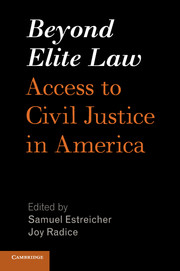Book contents
- Frontmatter
- Contents
- Beyond Elite Law
- Foreword
- List of Contributors
- Overview
- Overview
- PART I CURRENT STATE OF ACCESS TO LEGAL SERVICES
- PART II SOURCES OF LEGAL SERVICES ASSISTANCE FOR WORKING AMERICANS
- 10 Evolution of Legal Services in the United States: From the War on Poverty to Civil Gideon and Beyond
- 11 The Effect of Contingent Fees and Statutory Fee-Shifting
- 12 The Market for Recent Law Graduates
- 13 Clinical Legal Education and Access to Justice: Conflicts, Interests, and Evolution
- 14 Loan Repayment Assistance and Access to Justice
- 15 Federally Funded Civil Legal Services
- 16 New York's Lawyer Referral Services
- 17 Growth of Large Law Firm Pro Bono Programs
- 18 Institutionalizing Pro Bono
- 19 Pro Bono as a Second Career
- 20 Employer-Provided Legal Services for Employment Claims
- 21 Company-Provided Legal Services
- 22 Individualized Justice in Class and Collective Actions
- PART III FASHIONING A REFORM AGENDA
- PART IV CREATING A CULTURE OF SERVICE
- Index
17 - Growth of Large Law Firm Pro Bono Programs
from PART II - SOURCES OF LEGAL SERVICES ASSISTANCE FOR WORKING AMERICANS
Published online by Cambridge University Press: 05 May 2016
- Frontmatter
- Contents
- Beyond Elite Law
- Foreword
- List of Contributors
- Overview
- Overview
- PART I CURRENT STATE OF ACCESS TO LEGAL SERVICES
- PART II SOURCES OF LEGAL SERVICES ASSISTANCE FOR WORKING AMERICANS
- 10 Evolution of Legal Services in the United States: From the War on Poverty to Civil Gideon and Beyond
- 11 The Effect of Contingent Fees and Statutory Fee-Shifting
- 12 The Market for Recent Law Graduates
- 13 Clinical Legal Education and Access to Justice: Conflicts, Interests, and Evolution
- 14 Loan Repayment Assistance and Access to Justice
- 15 Federally Funded Civil Legal Services
- 16 New York's Lawyer Referral Services
- 17 Growth of Large Law Firm Pro Bono Programs
- 18 Institutionalizing Pro Bono
- 19 Pro Bono as a Second Career
- 20 Employer-Provided Legal Services for Employment Claims
- 21 Company-Provided Legal Services
- 22 Individualized Justice in Class and Collective Actions
- PART III FASHIONING A REFORM AGENDA
- PART IV CREATING A CULTURE OF SERVICE
- Index
Summary
“Big law” pro bono programs are a growing source of legal assistance for poor and working Americans. Steven Boutcher discusses the evolution of these pro bono programs since the 1960s and presents data on the number of hours lawyers have spent on pro bono over the past two decades and the types of cases involved.
A quiet revolution has taken hold across the American legal profession, which has had profound implications for the delivery of legal services to individuals of limited means. Although this revolution has not gone unnoticed, its presence has transformed traditional notions of legal professionalism, law firm practice, and contemporary public interest advocacy. The revolution is the institutionalization of pro bono programs, which has swept contemporary law firm practice.
THE RISE OF A PROFESSIONAL PRO BONO MOVEMENT
Over the last few decades, pro bono has experienced a growing resurgence across the legal profession. This is, in part, reflected in the sheer growth of empirical research on the topic, but is also indicated by the increasing importance that pro bono has come to play as an important component of the contemporary access to justice movement. These developments mark the advent of a contemporary pro bono movement, which has swept the legal profession in response to long-standing criticisms that American lawyers were stinting on their professional responsibilities to serve the poor.
Although the contemporary pro bono movement appears to have taken root across the profession, this was not always the case. Historically, pro bono was conceived and dispensed largely as charity from individual lawyers. Until as recently as the middle of the twentieth century, pro bono was delivered through the ad hoc, idiosyncratic interests of individual attorneys. Consequently, the services that were picked up were extremely limited and directed toward local charitable organizations or elite cultural institutions, such as the symphony or opera. This changed during the 1960s with the advent of President Johnson's “War on Poverty,” which shifted the meaning of pro bono from one rooted in noblesse oblige to a focus on “access to justice” – targeting direct legal services for the poor through the mobilization of government and legal services lawyers. The 1980s marked an era of retrenchment in providing legal services to the poor and the beginning of the shift toward the privatization of public interest law.
- Type
- Chapter
- Information
- Beyond Elite LawAccess to Civil Justice in America, pp. 270 - 284Publisher: Cambridge University PressPrint publication year: 2016
- 1
- Cited by



